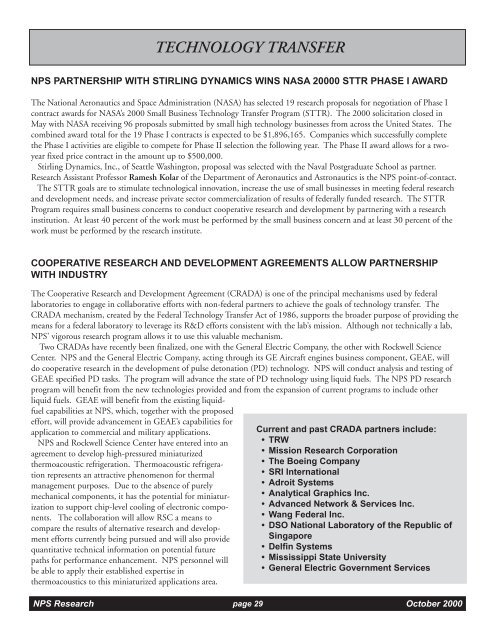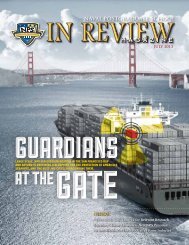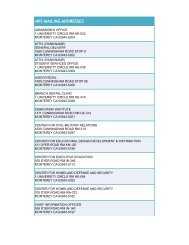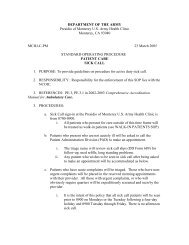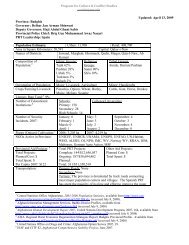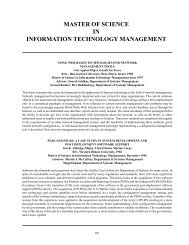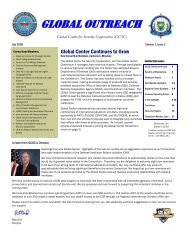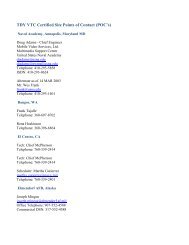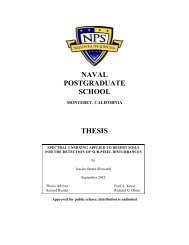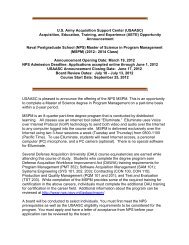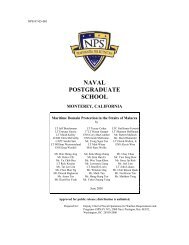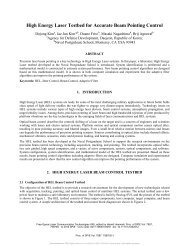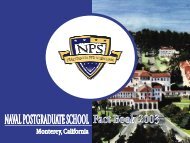October 2000 Newsletter - Naval Postgraduate School
October 2000 Newsletter - Naval Postgraduate School
October 2000 Newsletter - Naval Postgraduate School
Create successful ePaper yourself
Turn your PDF publications into a flip-book with our unique Google optimized e-Paper software.
TECHNOLOGY TRANSFER<br />
NPS PARTNERSHIP WITH STIRLING DYNAMICS WINS NASA <strong>2000</strong>0 STTR PHASE I AWARD<br />
The National Aeronautics and Space Administration (NASA) has selected 19 research proposals for negotiation of Phase I<br />
contract awards for NASA’s <strong>2000</strong> Small Business Technology Transfer Program (STTR). The <strong>2000</strong> solicitation closed in<br />
May with NASA receiving 96 proposals submitted by small high technology businesses from across the United States. The<br />
combined award total for the 19 Phase I contracts is expected to be $1,896,165. Companies which successfully complete<br />
the Phase I activities are eligible to compete for Phase II selection the following year. The Phase II award allows for a twoyear<br />
fixed price contract in the amount up to $500,000.<br />
Stirling Dynamics, Inc., of Seattle Washington, proposal was selected with the <strong>Naval</strong> <strong>Postgraduate</strong> <strong>School</strong> as partner.<br />
Research Assistant Professor Ramesh Kolar of the Department of Aeronautics and Astronautics is the NPS point-of-contact.<br />
The STTR goals are to stimulate technological innovation, increase the use of small businesses in meeting federal research<br />
and development needs, and increase private sector commercialization of results of federally funded research. The STTR<br />
Program requires small business concerns to conduct cooperative research and development by partnering with a research<br />
institution. At least 40 percent of the work must be performed by the small business concern and at least 30 percent of the<br />
work must be performed by the research institute.<br />
COOPERATIVE RESEARCH AND DEVELOPMENT AGREEMENTS ALLOW PARTNERSHIP<br />
WITH INDUSTRY<br />
The Cooperative Research and Development Agreement (CRADA) is one of the principal mechanisms used by federal<br />
laboratories to engage in collaborative efforts with non-federal partners to achieve the goals of technology transfer. The<br />
CRADA mechanism, created by the Federal Technology Transfer Act of 1986, supports the broader purpose of providing the<br />
means for a federal laboratory to leverage its R&D efforts consistent with the lab’s mission. Although not technically a lab,<br />
NPS’ vigorous research program allows it to use this valuable mechanism.<br />
Two CRADAs have recently been finalized, one with the General Electric Company, the other with Rockwell Science<br />
Center. NPS and the General Electric Company, acting through its GE Aircraft engines business component, GEAE, will<br />
do cooperative research in the development of pulse detonation (PD) technology. NPS will conduct analysis and testing of<br />
GEAE specified PD tasks. The program will advance the state of PD technology using liquid fuels. The NPS PD research<br />
program will benefit from the new technologies provided and from the expansion of current programs to include other<br />
liquid fuels. GEAE will benefit from the existing liquidfuel<br />
capabilities at NPS, which, together with the proposed<br />
effort, will provide advancement in GEAE’s capabilities for<br />
application to commercial and military applications.<br />
NPS and Rockwell Science Center have entered into an<br />
agreement to develop high-pressured miniaturized<br />
thermoacoustic refrigeration. Thermoacoustic refrigeration<br />
represents an attractive phenomenon for thermal<br />
management purposes. Due to the absence of purely<br />
mechanical components, it has the potential for miniaturization<br />
to support chip-level cooling of electronic components.<br />
The collaboration will allow RSC a means to<br />
compare the results of alternative research and development<br />
efforts currently being pursued and will also provide<br />
quantitative technical information on potential future<br />
paths for performance enhancement. NPS personnel will<br />
be able to apply their established expertise in<br />
thermoacoustics to this miniaturized applications area.<br />
Current and past CRADA partners include:<br />
• TRW<br />
• Mission Research Corporation<br />
• The Boeing Company<br />
• SRI International<br />
• Adroit Systems<br />
• Analytical Graphics Inc.<br />
• Advanced Network & Services Inc.<br />
• Wang Federal Inc.<br />
• DSO National Laboratory of the Republic of<br />
Singapore<br />
• Delfin Systems<br />
• Mississippi State University<br />
• General Electric Government Services<br />
NPS Research page 29<br />
<strong>October</strong> <strong>2000</strong>


